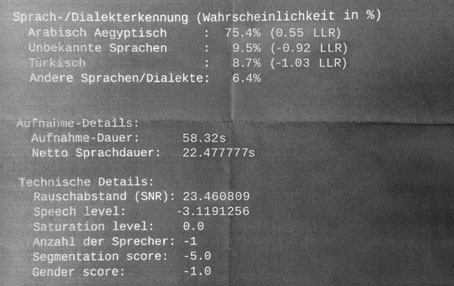Body as Evidence in Bordering Practices
- Start Page
- Calendar
- Body as Evidence in Bordering Practices

Example of a case file resulting from accent testing software used by German authorities in the asylum seeking process.
Welcome to a conversation between artist and Iaspis grantholder Pedro Oliveira and anthropologist Shahram Khosravi on the culture of disbelief created in and by the asylum seeking process. In this process, bodies are turned into data to be read or into evidence to be used in evaluation of the deservingness of the asylum seeker. In an environment of scepticism, immigration authorities aim to discredit asylum claims rather than to establish their substance; this can take many forms, amongst them measuring and translation of body, matter, voice, and accent. Through performance and dialogue Pedro Oliveira and Shahram Khosravi will intervene on the different temporalities present in this process, transposing it back onto the domain of listening and speaking.
Body as Evidence in Bordering Practices is presented by Iaspis, the Swedish Arts Grants Committee’s International Programme in collaboration with Critical Border Studies.
Pedro Oliveira is an artist and researcher in sound, whose work deals with the cultural and colonial articulations of listening, violence, and the policing of bodies in urban and border spaces.
Shahram Khosravi is Professor of Social Anthropology at Stockholm University and the author of several books including The Illegal Traveler: an auto-ethnography of borders, Palgrave (2010); and Precarious Lives: Waiting and Hope in Iran, University of Pennsylvania Press (2017).
Critical Border Studies is a network for academics, artists, and activists who are interested in border studies. It aims to push forward collaborative research projects, organize conferences and workshops and create a forum for contacts and collaboration between researchers.
Listen to the dialogue between Pedro Oliveira and Shahram Khosravi here

